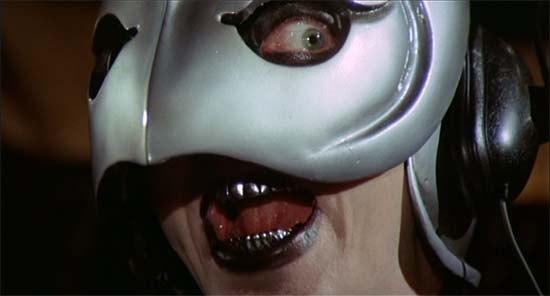 I saw a snippet of Phantom of the Paradise (1974) on television as a child; I remember Paul Williams talking to the masked Phantom, and thinking, “Who is this little man with the giant glasses and the shaggy blond hair, and why is there a masked man with black lipstick and silver teeth and a bulging eyeball talking to him?” It haunted me for years…until I finally rented it about a decade ago, and said, “Aha! So this is why I’m so messed up.” Because otherwise I was watching Superfriends and The Incredible Hulk and this just did not fit in with any of my familiar paradigms. I probably did recognize Paul Williams, somewhat, because he had been in The Muppet Movie (1979), which I watched over and over, and various episodes of The Love Boat, The Hardy Boys/Nancy Drew, and Fantasy Island – all shows which were hard to avoid in the late 70’s and early 80’s. But Phantom of the Paradise represented something so far from the beaten path that it could only leave a strong mental impression. Now I own both the CD and the vinyl LP, as well as the French import DVD (because it has extras, of course, which the Region 1 version does not), and I watch it ritually every year or so. I have joined the Paradise cult, really, and yet I still cannot tell you what the hell is happening in the last five minutes of the film – and my brain is fully-formed now (more or less).
I saw a snippet of Phantom of the Paradise (1974) on television as a child; I remember Paul Williams talking to the masked Phantom, and thinking, “Who is this little man with the giant glasses and the shaggy blond hair, and why is there a masked man with black lipstick and silver teeth and a bulging eyeball talking to him?” It haunted me for years…until I finally rented it about a decade ago, and said, “Aha! So this is why I’m so messed up.” Because otherwise I was watching Superfriends and The Incredible Hulk and this just did not fit in with any of my familiar paradigms. I probably did recognize Paul Williams, somewhat, because he had been in The Muppet Movie (1979), which I watched over and over, and various episodes of The Love Boat, The Hardy Boys/Nancy Drew, and Fantasy Island – all shows which were hard to avoid in the late 70’s and early 80’s. But Phantom of the Paradise represented something so far from the beaten path that it could only leave a strong mental impression. Now I own both the CD and the vinyl LP, as well as the French import DVD (because it has extras, of course, which the Region 1 version does not), and I watch it ritually every year or so. I have joined the Paradise cult, really, and yet I still cannot tell you what the hell is happening in the last five minutes of the film – and my brain is fully-formed now (more or less).
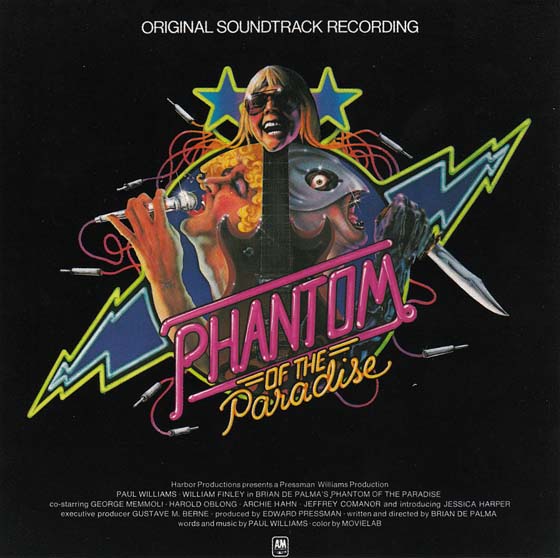
The soundtrack to the film.
It’s much easier to approach this film as an adult who can place it all in context. Brian De Palma was coming off a minor sensation with the low-budget shocker Sisters (1973), which initiated the Hitchcock comparisons that have dogged him for his entire career. Paul Williams was a singer/songwriter with a few hits under his belt, though most of them were performed by other artists (The Monkees, Three Dog Night, The Carpenters, Helen Reddy). His albums were the kind of soft AM music that you would put on the record player while turning the lights down low and guiding your lady friend across the shag carpet and over to the liquor cabinet for some drinks on the rocks. But increasingly in the 70’s he gravitated to film and television; after Phantom of the Paradise he would write the songs for the kiddie gangster musical Bugsy Malone (1976) – Christ, another film that haunted my childhood – before penning the numbers for The Muppet Movie (including “The Rainbow Connection” and “Movin’ Right Along”), a film in which he also appeared. He was an unlikely celebrity; he was short, and he looked a bit like Angela Lansbury, albeit with a voice like a cat’s growl. He was just as unlikely a suspect to collaborate with someone like De Palma, who was establishing an overstimulated cinematic style, hypersexual, intricately composed, and proudly cinephilic, dropping visual references to his favorite filmmakers in a manner which critics would come to love or loathe. Yet in Phantom those homages could find a comfortable home as parodies. De Palma saw the film as an opportunity to try on different costumes and play around: to make both a horror film and a musical, and to ape lots of other genres along the way. Paul Williams found an ideal showcase as both a songwriter and an actor. He’d write songs that would send up every musical genre he could think of, while skewering the soullessness of the music industry. And, as the Phil Spector-like rock impresario Swan, he would also be the star of the film. Whatever else this film was going to be, it was guaranteed to be unique.
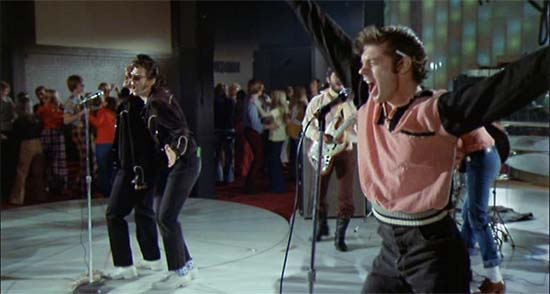
Archie Hahn leads the Juicy Fruits in "Goodbye, Eddie, Goodbye."
The storytelling is as much in the music as it is in the script, and in De Palma’s dazzling visuals. In the opening song, “Goodbye, Eddie, Goodbye,” the Juicy Fruits (a Sha Na Na-styled retro group, led by comic actor Archie Hahn) sing about a rock star who commits suicide to boost his album sales, thus raising money for his sister’s operation. The idea would be satire if it weren’t completely believable; it also sets the stage for some of Phantom‘s central themes: doing anything to become famous, and the public’s lust for morbid spectacle. Meanwhile, De Palma goes to work, cramming his frame with information: while Hahn sings and combs his greased-up hair, we see one of his back-up singers initiating a brawl with a guy in the audience, and then making out with the guy’s girlfriend – he returns to the stage holding a brassiere. This is immediately followed by the introduction of Arnold Philbin (George Memmoli, Mean Streets), who is pleading to Swan – directly to the camera – in a spoof of the opening of The Godfather. But listen to what he’s saying. Their latest manufactured starlet wants to break with Swan’s Death Records (originally to be called Swan Song, until Led Zeppelin, just launching their own label with that name, put an end to that). Even though Philbin bribed the judge, the court refuses to accept the validity of signing someone to a lifetime contract. So the next crucial theme is established: signing a contract with a record company is equivalent to signing over your soul.
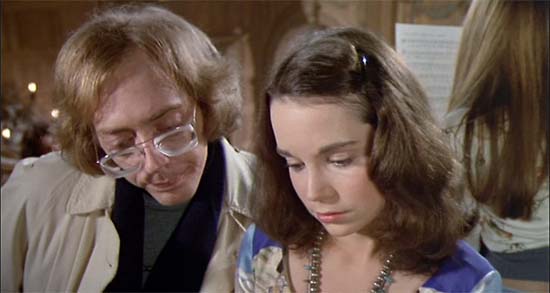
Amateur composer Winslow Leach (William Finley) meets - and falls for - amateur singer Phoenix (Jessica Harper).
While Philbin talks, the Juicy Fruits leave the stage, to be replaced by Winslow Leach (William Finley, Sisters), taking the piano to sing his song “Faust.” Swan is immediately taken by the songwriting, and asks Philbin to persuade Leach to sign over the number so it can be used for the opening of Swan’s latest club, The Paradise. (Though Williams is playing Swan, it’s easy to imagine that he saw himself in Leach: sincere, talented, but lacking the good looks and natural charisma that typically define a pop star.) Swan wants Leach’s words, but not his voice. For that, he auditions hundreds of girls, though when they show up at his palace, it’s only to join an orgy on a giant circular bed. (Revenge of the Cheerleaders fans should watch for a small part by Cheryl “Rainbeaux” Smith.) The beautiful young singer Phoenix (Jessica Harper) forms a fast friendship with Leach, but when she realizes the sleazy nature of Swan’s auditions, she leaves in disgust. Leach, desperate to receive credit for his songs, infiltrates in drag. Paul Williams is introduced in a robe and with a smirk on his face; he throws Leach out, and two cops, bribed by Swan, plant smack on him. Leach is taken to Sing Sing (get it?), where his teeth are removed (to prevent infections, we’re told) and replaced by metal. Along with other prisoners, he’s forced to work at the Death Records packaging plant, where he hears the latest single by the Juicy Fruits, “Faust.” Leach goes into a rage, escapes the plant, and heads to Swan’s corporate headquarters, where an accident in a record press mangles half of his face; he stumbles off, bleeding and moaning, into the night. When he returns, he will be the Phantom.
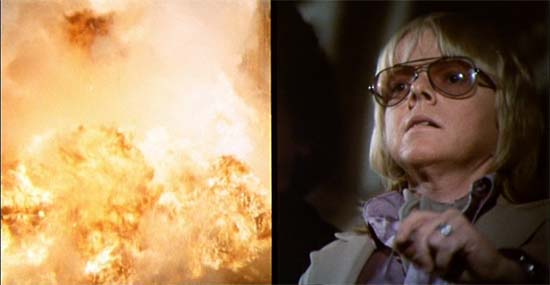
The trademark De Palma splitscreen: the Phantom sets off an on-stage explosion while Swan (Paul Williams) watches.
The Phantom’s first crime might be the film’s most famous scene. De Palma offers two continuous extended takes in split screen, showing simultaneous events at The Paradise. While “The Beach Bums” (a Beach Boys parody – the same performers from The Juicy Fruits) rehearse onstage with girls in bikinis, Swan looks on from a balcony above, and the Phantom sneaks a bomb into the trunk of a prop car which is wheeled toward the band. On the one hand, the scene works as an extended parody of the opening shot of Orson Welles’ A Touch of Evil (1958); but it’s a marvel of staging, as we occasionally see the same characters from two different angles, each shot providing different information, culminating in Swan catching a glimpse of The Phantom just before one camera swings toward the on-stage explosion and the other zooms in on Swan’s face. After this first murder is committed, and with so much exposition out of the way, the viewer ought to expect the film to settle into Phantom of the Opera mode. Instead, the Phantom confronts Swan directly, and Swan, grinning, immediately pulls the mask right off Leach’s face. He pushes Leach into a bargain: continue working on the Faust cantata, and he’ll use it to open The Paradise. The bargain is further cemented when Swan agrees to use Phoenix as the star, to Leach’s satisfaction. He signs his name in blood upon a contract provided by Swan, which is hundreds of pages long, worded in a vaguely sinister legalese, and somewhat reeks of the occult. But after Leach finishes his compositions, Swan seals him behind a wall of bricks, so that the headliner of Faust can instead be his latest musical discovery, “Beef” (Gerrit Graham), who uses an Alice Cooper-like theatrical persona to mask his behind-the-scenes effeminate vamping. On the night of The Paradise’s opening, the Phantom escapes, and wreaks havoc – until he learns the full implications of that contract he signed, and which Phoenix has signed as well.
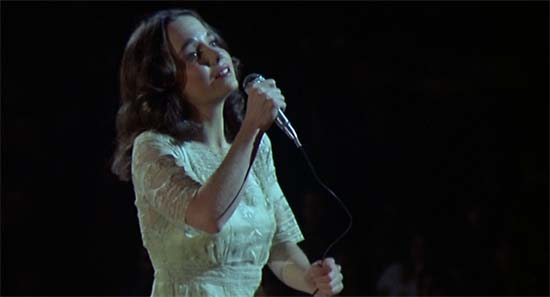
Jessica Harper sings "Old Souls" at The Paradise's premiere of Faust.
De Palma and Williams are both at the top of their game, and the enduring cult appeal of the film lies in its fusion of clever visuals and sharply-written (albeit very 70’s) songs. But they had a secret weapon in Jessica Harper, the 25-year-old actress with a surprisingly rich voice. Harper would develop a habit of attaching herself to idiosyncratic projects; she’s as well known for this film as her roles in Dario Argento’s masterpiece Suspiria (1977) and Woody Allen’s Fellini homage Stardust Memories (1980). She was able to use her singing voice again in Shock Treatment (1981), playing Janet Majors, the role originated by Susan Sarandon in The Rocky Horror Picture Show (1975) – a film to which Phantom of the Paradise is often compared (perhaps unfairly to both films). But Phantom is a stealth musical. De Palma puts every number in context; no one bursts into song unless they’re on stage and have a reason to. He does embrace the musical sequences, particularly in a striking proto-music-video montage for Williams’s rendition of “Phantom’s Theme (Beauty and the Beast),” and in the “Somebody Super Like You”/”Life At Last” medley, which takes on both glam rock and heavy metal. Ironically, the film’s best song, “The Hell of It,” is only attached to the ending credits; but it’s impossible to not sit through those credits as a result. Phantom of the Paradise could easily have been a more fleshed-out musical, but there’s so much story – and comedy and spectacle – that it’s already a very packed 90 minutes. Should they ever remake the film, it demands to take place on the set of American Idol, or some equivalent. Few of the film’s cynical ideas about the major-label music industry are out of date.









